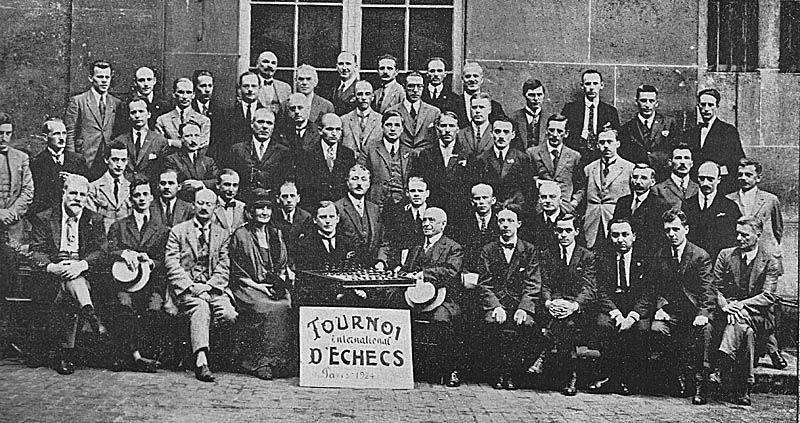1924
1924 16.04 The Belgian newspaper “La Nation Belge” published the copy of an invitation sent by the French Chess Federation to all national chess federations to attend a chess congress in Paris on July 20. The main item on the agenda was the creation of an International Chess Federation.
1924 12.07 The 8th Olympic Chess Tournament took place in Paris, France. Witnessed by the Committee of Honour that included the Mayor of Paris’ 9th district Mr. Sauphar, the Counsel of Argentina, Alexander Alekhine and all the officials from the French Chess Federation, the fifty-four players from eighteen countries took the Olympic oath and signed the Golden Book of the FFE.
1924 19.07 At the end of two days of meetings under the Presidency of Mr. Pierre Vincent of France and Mr. Stick van Linschoten of Netherlands, the delegates of eleven countries agreed to create the “Federation Internationale des Echecs”. The Bureau invited other Federations from Germany, Austria and Soviet Union that were not present in Paris to join them. The Bureau was in charge of developing the Statutes of the “Federation Internationale des Echecs” using as a base the Draft published in 1914 by the British Chess Federation.
1924 20.07 The results of the International Amateur Chess Tournament held in connection with the 8th Olympiad in Paris and terminated toward the end of July, was of an outstanding interest to the chess world. That event marked another step forward, aside from its intrinsic merit, on the way of formation of an International Federation of amateur chess players.
1924 20.07 The Olympic Tournament for national teams was limited to 18 teams The winner was Czechoslovakia with 31.5 points. The Latvian H. Mattison ranked first individually and earned the title ‘Amateur Champion of the 8th Olympiad.
1924 20.07 The award of prizes and distribution of diplomas took place in the gaily decorated hall, which had been the scene of the tournament. After the colours had been duly saluted, Monsieur Pierre Vincent, General Secretary of the French Federation, authorized by the President, announced the outcome of the tournament. Splendid plaques donated by the French Ministry of the Exterior, were then awarded to Messrs. Mattison of Latvia, Apseniecks of Latvia and Colle of Belgium, as individual winners, and also to Alexander Alekhine who acted as the conductor of the tournament.
1924 20.07 FIDE was created. At the closing ceremony of the 8th Olympiad Chess Tournament, Mr. Pierre Vincent read “The Protocol of registration” which was unanimously adopted and signed by the delegates.
Le Dimanche, 20 juillet 1924, à la Mairie du IXè Arrondissment de la ville de Paris. Grâce à l’initiative de la Fédération Française des Echecs, d’après la volontée unanime des fédérations contituantes representées au congrès, à la suite du premier tournoi international d’Amateurs d’Echecs, à l’occasion de la VIIIè Olympiade à été à fondée :
La Federation Internationale des Echecs
Elle existe dès ce jour, avec les principes fondamentaux suivants.
La Federation Internationale des Echecs est une association de fédérations nationales des échecs.
Toute fédération nationale pourra s’y joindre.
Toute fédération nationale sera traitée d’après le principe d’égalité parfaite.
Toute nation, qui n’a pas encore une fédération nationale est invitée à la former, si elle désire se joindre à la Federation Internationale des Echecs.
La Federation Internationale des Echecs aura pour but le developpement de l’art des échecs, comme jeu universel, de propager l’idée d’entente entre les Fédérations, de favoriser toute demonstration internationale relative au jeu des échecs.
Elle aura son siège en Suisse, jusqu’à l’assemblée générale projetée pour 1925.
Jusqu’à ce congrès, les dispositions suivantes ont été prises:
La Fédération Internationale des Echecs sera administrée par son Bureau, qui aura soin de proposer au Congrès de 1925 les status et tous les reglements nécessaires, et de prendre toute mesure favorable au developpement de la Fédération.
Toute Fédération constituante et toute autre adhérente contribue par une somme minimum de 300 francs français payable à l’adhesion.
Sur ces fonds le Bureau prélevera la somme nécessaire à son fonctionnement.
Jusqu’au Congres de 1925 sont élus:
President : M. A. Rueb, President de la Société néerlandaise des Echecs.
Vice-President : M. L.P. Rees, Secretaire de la société britannique des Echecs.
Tresorier : M. M. Nicolet, Caissier central de la société suisse des Echecs.
Le secretariat général est rattaché à la Présidence.
Ont signé le protocole de constitution:
Grande-Bretagne: Major F.HH. Rawlins Hollande: A. Rueb
Canada: S.F. Smith Belgique: J. Weltjens
France: P. Vincent Tchecoslovaquie: K. Skalicka
Jougoslavie: J. M. Ovadia Argentine : R. Grau
Suisse: M. Nicolet. Espagne : Comte de Penalvez
Italie: F. Marusi Pologne : T. Tovbin
Roumanie: Lieutenant Gudju Hongrie E. Abonyi
Finlande: A.Tschepurnoff
1924 01.11 FIDE asked the International Olympic Committee to consider chess to be included in the 9th Olympic Games of 1928.
”…Le jeu d’échecs est une épreuve du même genre que toute autre épreuve olympique. Il compte de nombreux adeptes parmi toutes les nationalites representées aux Olympiades. Aux echecs, c’est l’esprit qui entre en jeu : est-ce que l’esprit ne domine pas la plupart des sports modernes et olympiques ?
L’admission des échecs est absolument conforme à la conception classique des jeux olympiques.
Jamais les fêtes nationales helleniques n’ont refusé leur place au jeux de l’esprit et aux beau-arts. L’admission des échecs ne devrait guère peser sur le budget de la Xème Olympiade, la FIDE renonçant à toute subvention financière, et est prête à se charger elle-même de l’organisation de la compétition…’’



